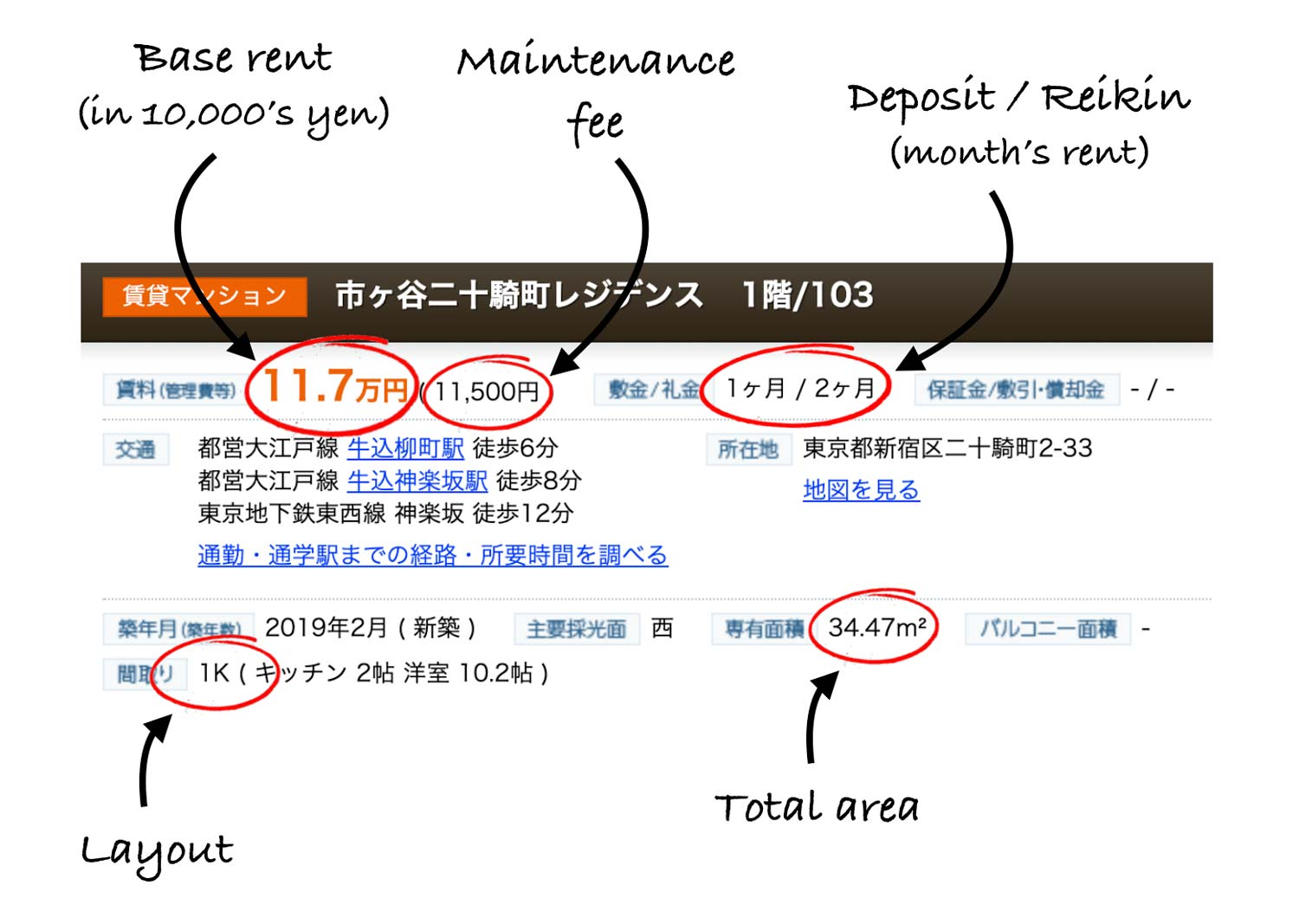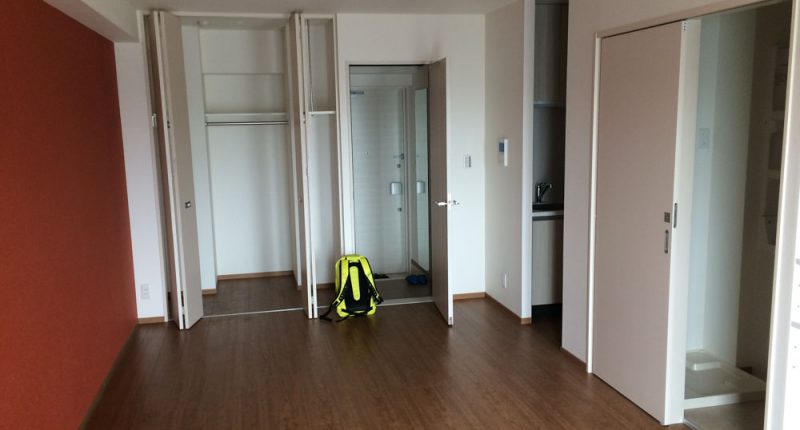Renting in Japan can be a bit of a daunting process. The contracts terms are long, initial costs high, and documentation seemingly never ending. But while all the terms might seem onerous, they are also designed to protect the tenant, which is why many in Japan can rent securely, knowing that the landlord or owner won’t come round to check on the property, and don’t have to live under a cloud of uncertainty worrying about if they will be given notice next month.
Viewing Properties
Before you begin your search it is worthwhile taking a look here if you are not familiar with the different types of properties in Japan, as well as the terminology used to describe layouts and so on.
Popular sites and apps for viewing properties include chintai.net, homes.co.jp, and suumo.jp. There is almost complete overlap in terms of available properties between the sites, so there is little reason to check them all. You can make a booking with an estate agent through any of these sites. Otherwise, you can go and ask directly at an estate agents. In Tokyo, estate agents are everywhere—walk out of any station and you are almost guaranteed to find one within 100 meters. Which one doesn’t really matter as the majority are independent operations that utilize the same database to search for properties. In cases where the tenant has vacated and the property has been cleaned, viewings can usually be arranged there and then. It is, however, advisable to arrange an appointment in advance.
The estate agent will meet you at the property or guide you there from their offices. As the property will have been professionally cleaned, you will need to take off your shoes at the porch area. The estate agents usually bring slippers along for customers.
Below are some other things to be aware of when you’re looking at properties.
- Is the internet included? Many of the newer condominiums include wireless internet for free. The little router will be built discreetly into the wall. This saves you the hassle of setting up a separate contract, which would otherwise cost about ¥5,000 per month.
- Is there an air-conditioning unit? Usually the air-conditioning unit is the only thing that is included with the room, but sometimes you’ll be expected to buy these units yourself, and even cheaper ones can cost ¥40,000.
- Is there an allotted space for a bicycle? Most condominiums and apartment blocks include one bicycle slot on the ground floor for each apartment, but this isn’t always the case (or there is a small monthly charge for usage).
- Does the property allow pets? Most properties in Japan strictly prohibit pets. You should definitely let the estate agent know if you have a dog, cat, turtle…
Regrettably, is it is sometimes the case that the owner of the property will not accept applications from foreigners. Unfortunate as this is, there is not much you can do about it, and will have to carry on with your search, gaining what satisfaction you can from knowing that this prejudice has likely cost the owner some lost rent. Nevertheless, although rare, because it does occasionally happen, if you are taking time out of your schedule to visit a specific property, then it’s worth asking the estate agent to confirm in advance that applications from foreigners will be accepted to save a wasted journey. Incidentally, if your spouse is Japanese, you are unlikely to face this issue.
Note that viewing an occupied property is strictly prohibited. If a property is being advertised for rent while someone is still living there, then you will either have to wait until they have vacated (and possibly until the property has been professionally cleaned) to have a viewing or sign a contract based off a floor plan and photographs. This may seem risky, but age, location, and rent per square meter relative to other properties in the area give a good indication of what you can expect, and once you have seen several properties you begin to have a good idea from the layout plans what it’s going to be like.
Securing a Property
Once you’ve found a property you want to rent, the first thing to do is ask the estate agent to secure the property for you. This is done by filling in an application form which contains basic information (name, current address, workplace, salary, etc.). You will also need an emergency contact person and to provide a copy of both sides of your residence card. The estate agent will then send these details to the property’s management company who will perform a credit check, which takes about one week. You may be required to submit additional documentation like a tax withholding slip or three months’ of pay slips. The important thing is that once the application form has been accepted by the management company, the property is blocked to other viewings. Note that there is nothing stopping you from dropping out because you have not signed any agreement, but you will get into trouble if you start going round making multiple applications to secure a few properties you like before deciding.
While the credit check is being made, the estate agent will send you a quotation (見積, mitsumori) of the initial cost which will include the fees explained below.
The Costs
With that said, here’s a breakdown of the likely costs involved once you’ve found your perfect property. As you will see, the initial cost of renting can run up to 3-6 months’ worth of rent.
Base rent
This is pretty self-explanatory. It is the monthly rent for the property. It is called yachin (家賃) or chinryō (賃料).
Maintenance fee
Mansions and apartment buildings in Japan charge a monthly maintenance fee like in many other parts of the world and this cost is passed onto the renter. This maintenance fee likely to be higher if the property has a concierge or other amenities like a fitness room. In Japanese, it is called kyōekihi (共益費) or, more commonly, kanrihi (管理費).
Reikin
Often translated as “key money”, reikin (礼金) is an upfront fee that you pay to the landlord in order to sign the contract. Unlike a deposit, It will not be returned to you. Some rooms are advertised without key money, but one month’s rent is typical and two months’ rent is not uncommon.
Deposit
The deposit (敷金, shikikin) is typically one month’s rent, but can be as high as three months’ rent for owners that want to keep pets in the room. Do not expect to get all of this back. There will be a charge to have the apartment professionally cleaned when you move out (this is not something you can tell the owner you will do yourself) and there may be other fees that cover changing the locks or cleaning the air-conditioning unit(s). Incidentally, changing the locks between tenants is common practice in Japan, as the safety-conscious Japanese do not want to think that there’s someone out there with a full set of keys to their home.
Insurance
This comprises of rent insurance (usually around 40% of one month’s rent) and fire insurance (about 5-10% of one month’s rent). The first is usually but not always required. Individuals are allowed to act as guarantors, but this is rarely a possibility for foreigners as the person needs to be a relative. The rent insurance fee, if you renew your contract, usually drops by about half.
Brokerage fee
This is the estate agent’s fee. Under Japanese law, estate agents are prohibited from receiving, in total, more than one month’s rent in brokerage fees; the question is, who pays? You have cases of the tenant paying 100%, the owner paying 100%, or both splitting the fee down the middle. This is one area you can negotiate. In Japanese, it is called chūkairyō (仲介料).
Parking fees
For condominiums and apartments, a parking space is not included in the rent. If you own a vehicle, you will need to pay a separate parking fee—and it is not cheap. In Tokyo, ¥30,000-40,000 per month is fairly standard. For motorbikes, it depends on the size. Scooters and smaller bikes, about ¥3,000 per month is common. If you own a Harley, then you might find yourself paying up to ¥15,000 per month.
Renewal fee
When you get to the end of the two-year contract and wish to renew, in almost all cases you will need to pay one month’s rent as a renewal fee. In Japanese, this fee is called kōshinryō (更新料).

Can I negotiate?
Certainly you can with respect to the brokerage fee. Estate agents are in competition with one another and working with the same database of properties. Even once you’ve made an application to secure a property with one estate agent, another might tell you that they can help you lower the total initial cost. This basically means they are willing to take a smaller fee because the hard work of finding a tenant for the property has already been done by another agent. With respect to the other costs, it is more difficult. The maintenance fee, for example, is set by the company that manages the property and is non-negotiable. And if the property is owned or managed by a company then base rent negotiations are also not usually possible.
The real cost for first time renters
Unfortunately, the above omits to mention that when you first turn the key to your new apartment you will be greeted by nothing: no fridge, no microwave, no washing machine, no bed, no curtains, no furniture, no lights, and (in some cases) no air conditioning unit. Apartments are leased bare in Japan, and renters are expected to bring all their own furniture with them.
The Contract
There are two types of rental agreements in Japan.
- Standard rental agreements (普通借家契約, futsū-shakuya-keiyaku)
- Fixed rental agreements (定期借家契約, teiki-shakuya-keiyaku)
Standard rental agreements
Standard rental agreements are for two years. Unless the owner has a legally valid reason, these contracts can be renewed at the tenant’s discretion once the two-year period is up. These contracts make up the majority of rental agreements.
Fixed rental agreements
As the name suggests, these rental agreements are for a fixed term (almost always at least two years). They are typically used by individual owners who are vacating the property for a number of years (because, for example, their company has sent them overseas) and want to monetize their home and cover the mortgage during their absence. In principle, these rental agreements cannot be renewed, so once the contract term ends then you will need to find somewhere else to live.
Aside from the different types of contracts, there are a couple of other things about Japanese rental agreements to note.
Firstly, unlike some other countries, the owner or landlord will never come round to inspect the property. This would be unthinkable in Japan. Most properties, whether owned by companies or individuals, are managed through specialist management agencies which deal with the contracts and any issues that might arise. If the end owner is an individual, the only time you may meet them is if they join for the inspection of the property once you terminate the contract.
Secondly, the documentation involved is substantial with a lot of small print. The legal language outlines what you can and cannot do in the apartment, as well as the procedure for repairs and so on. Making all this explicit upfront means that you can expect any problems with the property (e.g. faulty elevators, broken mail boxes) to be dealt with expeditiously. These terms are also there to protect you as the tenant.



